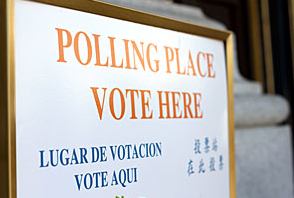Today's off-year election may be characterized on a national level by the search for signs and portents of things to come in next year's Big Show -- the 2012 presidential contest.

But in the Bay Area, several interesting questions will be decided, not the least of which is who will be the next mayor of San Francisco.
That election is seminal in several ways. Incumbent Ed Lee is considered the favorite, and should he or fellow candidates David Chiu, Leland Yee, Jeff Adachi, or Phil Ting emerge victorious, San Francisco will have elected its first Asian-American mayor. (Lee was appointed by the Board of Supervisors, not elected by voters, when former mayor Gavin Newsom left to become Lt. Governor.)
If this were like every other previous San Francisco mayoral race, Lee might be considered a shoo-in. A mid-October poll put Lee as the first choice of 31 percent of voters, out of a 16-candidate field. His nearest competitor, Dennis Herrera, garnered only eight percent in the survey.
But as Don Perata learned during Oakland's mayoral contest last year, under ranked-choice voting, a lead in the first round of vote-counting does not seal the deal, and can slowly dissipate over subsequent rounds. Perata commanded an 11 percent leader after the first round, but because significantly more voters chose Quan as their second or third choice, Quan emerged the victor, receiving 51% of the vote to Perata’s 49% after 10 rounds of counting.
Lee's opponents -- at least a few of whom are furious he assured them he wouldn't run for a permanent spot as mayor -- have been trying to pierce the sense of an inevitable Lee victory by filing complaints about questionable efforts and fundraising on his behalf. Several candidates even went so far as to band together in requesting that the state or federal government monitor the election for potential shenanigans. And indeed, the California Secretary of State's office announced yesterday it would send monitors to San Francisco.